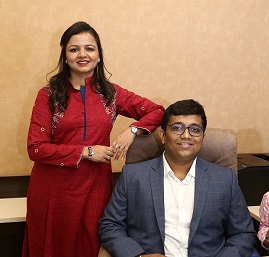This success story proves that economic crisis could be a good entry point for budding entrepreneurs.
In the tumultuous 2008 stock market crisis when many investors shied away from mutual funds, Viral and Kruti started their mutual fund distribution practice in Rajkot, Gujarat. Kruti worked at a national distribution firm in the sales department. Realising how mutual funds could be a great way for investors to build wealth and the sector’s immense potential, Kruti struck out on her own by quitting her job. Viral was looking after the family’s automobile business. Viral also decided to join hands with Kruti. It was an uncharted territory for Viral.
Investors unfamiliarity with mutual funds presented a clean slate to Viral. The duo had an early mover advantage. Their entry in financial advisory coincided with the stock market meltdown in 2008 which had severely dented investor sentiment. But this event turned out to be a blessing in disguise. Many non-serious distributors shut shop in response to the market crash, leaving orphaned investors to fend for themselves. This left a void for handholding and guiding investors which they tried to fill in. But Viral discovered that many retail investors were too scared to put money in equity mutual funds. Thus, Viral and Kruti decided to reach out to corporates by presenting them the concept of earning returns from their idle funds which were usually parked in current accounts. But the journey was not as smooth.
They hit the ground running with a hope to popularise debt funds and liquid funds. They drew up a list of around 100 most influential families and firms in Rajkot and began approaching them. It was purely cold calling. The prospects had many queries such as - Why would AMC need money for one day, who does the fund house lends money to, what are the risks, and so on. Viral and Kruti patiently educated investors about the benefits of mutual funds. Sometimes, AMC officials too joined with them to answer prospects queries.

Corporates experimented by putting a tiny portion of their idle funds in liquid and liquid plus instruments. As their comfort in the product grew, they started putting larger sums of money. Further, the benefit of indexation also helped investors earn an attractive post-tax return vis-à-vis other traditional products like bank FDs.
They got their first big-ticket client in 2011. It was an entity that invested Rs 75 crore in debt funds.
Viral recalls that making inroads in the institutional market was not as smooth. They faced their share of rejections and it took a lot of time to build trust with prospects. “It took a lot of time to build trust with corporates. We don’t chase them. We maintain the relationship even if prospects don’t invest with us. This business is about maintaining and growing your network and relationship. The business comes once prospects have confidence in you,” says Viral. Viral vividly remembers those days when 70% of the total business in mutual funds was contributed by his firm in his area.
Once the equity markets started recovering from the 2008 turmoil, Viral found that investors were more inclined towards equity. Viral and Kruti then started building their equity book. Over the years, they have expanded their product bouquet to include a host of products like corporate fixed deposits, debt syndication, insurance, PMS, AIF, real estate and investment banking services.
Debt debacle
The early default events that rocked the fixed income market came as a bolt from the blue. Thankfully, Viral sensed early signs of trouble in credit risk funds owing to the various headwinds the economy was facing. He sensed that there could be more bouts of such defaults in the future. In response to this, they started moving investors towards the safer segment of debt funds. Since the March 2020 market crash, Viral’s clients have redeemed more than Rs 500 crore from debt funds.
Investment banking
Owing to his network, Viral also gets a lot of requests from clients who intend to sell their business/asset. “I arrange meetings with the prospects looking to buy or sell companies. Some work is done by us internally while other is outsourced. The due diligence is usually done by the buyer. The success ratio in such kinds of deals is very low. It takes months and years to close one deal. Sometimes, the deals don’t materialise. So one needs to have a lot of patience.” So far, Viral has closed two such deals.
Road ahead
While Viral’s roots are in Rajkot they have now moved to Ahmedabad where they have set up their office. Today, the husband-wife duo manage Rs 800 crore across products, a significant portion of which is in debt funds.
Their clientele includes both listed and unlisted firms, MNCs, high net worth individuals and retail clients. Viral says that in order to win the confidence of big-ticket size investors, advice backed with research plays a vital role in showcasing value add.
Viral is witnessing some tectonic shifts that are currently underway in the wealth management industry. The rise of digital platforms, changing investor expectations, coupled with growing popularity of direct plans is nudging distributors to tweak their business models. In order to be competitive and remain relevant in the HNI and institutional segment, they need to move to the advisory model sooner or later. Viral is currently studying the RIA model closely and hopes to make a successful transition soon.